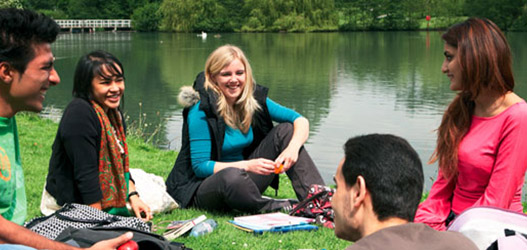
Studying abroad in the UK can be a daunting experience, but with this short guide and these 10 simple tips, you’ll have the time of your life:
1. Visas and paperwork
You need to ensure you have the correct visas and other paperwork to study in the UK. It’s not complicated to get, and the UK encourages international students to study there, but you need to go through the processes and ensure you have it.
If you have a particular preference of University, it’s worth asking them for help as there will often be a dedicated member of staff whose job it will be to help international students apply to their University.
2. Cheap travel for students

Once you’re registered as a student in the UK you can get access to some very cool travel discounts for students. By using specialist student suppliers, like StudentUniverse, to book your flights you can get discounts exclusively for student travellers.
You can also get young person railcards that ensure you get 1/3 off of all rail travel, which very quickly adds up if you’re considering seeing a bit of the UK whilst you’re there.
3. Student accommodation
Accommodation is one of the most important things to consider when you’re coming to the UK as an international student. This is where you’ll spend most of your time, where you’ll meet your first university friends and of course, where you have to sleep!
The first thing to do when choosing your accommodation is research the positives and negatives of the available options. Sure, it might be cheaper in a particular hall, but would you prefer to pay a bit more and get your own en-suite? Often there are specialist international student halls as well where staff are more experienced at helping you adjust to the UK student lifestyle when coming from abroad.
There are tonnes of reviews out there on student accommodation as well, and once again University staff can be very helpful in advising on the best accommodation based on what you want.
4. Storage for the summer
Student accommodation rentals often expire at the end of June as most UK students tend to return to where they are originally from over the summer. Often international students choose to spend this time exploring other parts of the UK or travelling around Europe, and so you need to consider what you’re going to do with your stuff over this period.
There are dedicated suppliers who will store your worldly possessions whilst you’re exploring and this can often be the cheapest and most efficient thing to do. Alternatively, you can try and sort your next year’s accommodation out and get your stuff into there, but that’ll likely be considerably more expensive.
5. Independent study in the UK

In the UK the format of University study may be slightly different to what you’ve been used to at home, and this can take some getting used to. The study format is classed as ‘independent’ in that most of the work you’ll do for your course will be done in your own time and by researching and learning.
You’ll have weekly seminars and lectures, but this will often take up just a fraction of your time comparatively to how you may have studied before with some courses having just 7 or 8 hours per week. This means you have a lot of ‘free’ time to spend in the library and on the internet researching, learning and developing your knowledge.
6. University bursaries
When coming to the UK to study, international students can get bursaries that cover part of the fees and/or living expenses. These bursaries are awarded based on a number of different criteria, but they predominantly fall into 3 categories; to encourage academic excellence, to increase the diversity of the Universities student population and to help develop international relationships.
Each university will likely have their own bursary scheme which will offer much more detail about requirements and how to go about applying for the funds. It’s definitely worth your time to do a bit of research into your chosen institution to see if they can help with the sometimes high costs.
7. Student bank accounts
In the UK it’s standard practice for students to have a student bank account. These student bank accounts often come with decent sized, no-interest overdrafts and allow you some flexibility with your money. They also regularly have incentives included like railcards and gadgets to get you to choose a particular bank.
It’s worth researching the main student bank account suppliers (the likes of Natwest, HSBC, Lloyds and Santander) to see which one fits your needs the most. It’ll likely save you some cash at least a few times whilst you’re studying abroad in the UK.
8. Working in the UK whilst a student
Unlike a lot of countries, studying in the UK as an international student is generally fine. Laws are a lot more relaxed in the EU for international employment, and so if you need to make some money to help support your international study experience, it’s advisable to get a job.
Most UK students will at one time have either done bar work, waited tables, worked in a supermarket or done promotional work to make some money whilst at University. They’re very flexible jobs that will allow you to work hours you choose that fit around your study, and generally pay okay.
If you’re short of money, it’s definitely an important thing to consider.
9. Fresher’s week and international student welcome events

When you arrive at your UK University you’ll likely be thrust into the start of ‘Fresher’s Week’. This is a week designed to help students adjust to their new University lives and often involves a tonne of induction and welcome events.
These welcome events can range all the way from course inductions to huge bar crawls, and so it can be a very important and potentially defining period of your University life.
As an international student, you’ll likely be made aware of particular events that are designed to help international students adjust to coming to the UK. These will deal a lot more with British culture and you’ll often get to meet people who are going through a very similar experience to yourself. Attending these is highly recommended, and definitely something that will help shape your studying abroad experience in the UK.
10. University societies
In UK Universities students often create their own societies based on shared interests. These societies can be hugely varied and range from popular sports like football and rugby, to things like real ale appreciation and Chinese student associations. In short, there’s likely a society for you whatever your interests are.
By joining these societies you get to spend time with people who share the same interests as yourself, and these can be a great way for you to make new friends whilst having fun doing something you really enjoy.
By attending ‘fresher’s fairs’ (a big event often taking place towards the end of fresher’s week) you’ll get the chance to meet most of these societies. Alternatively, you can go to your student union and ask for details of a society you’re interested in or head onto the website and find it yourself. It’s also never too late to join a society; they’re always keen for new members to join!
That’s it.. 10 things international students need to know when coming to the UK to study.
Please share this post if it helped you when looking to study in the UK, and remember that if you’re a student or youth traveller, you can get discounted rates on flights, hotels and tours at StudentUniverse.
0 Comments